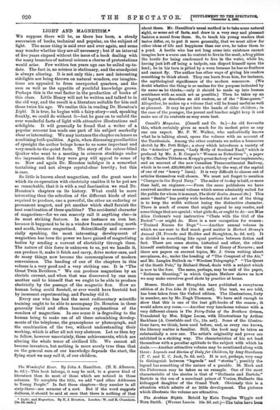The Wonderful River. By John A. Hamilton. (H. R. Allenson.
3s. 6d.)—This book belongs, it may be said, to a graver kind of literature than do most of those which are noticed in these columns. To complete the title, we add " and other Addresses to Young People." In fact these chapters—they number in all sixty-three—are sermons of a sort. But if the word suggests dullness, it should be said at once that there is nothing of that
• Light; and Magnetism. By E. J. Houston. London : W. and R. Clambers. [3s. (kt each.]
about them. Mr. Hamilton's usual method is to take some natural sight, or some set of facts, and draw in a very racy and pleasant fashion a moral from them. So, to teach his young readers that tastes differ, or, to put it more generally, that we must allow for other ideas of life and happiness than our own, he takes them to a pond. A beetle who has not long come into existence cannot imagine how a worm can be content to live in the mud; a frog pities the beetle for being condemned to live in the water, while he, having just left off being a tadpole, can disport himself upon the land; he in his turn is pitied by a wren because he has no feathers and cannot fly. The author has other ways of giving his readers something to think about. They can learn from him, for instance, the mythological significance of the modern scarecrow. (We doubt whether the thing is so useless for the purpose indicated by its name as he thinks,—only it should be made up into human semblance with as much art as possible.) Then he takes up an old legend, or describes an old custom, as of the " Rose-queen." Altogether, he makes up a volume that will be found useful as well as pleasant. It may be put into the hands of elder children ; in the case of the younger, the parent and teacher might keep it and make use of its contents as may seem best.






































































 Previous page
Previous page